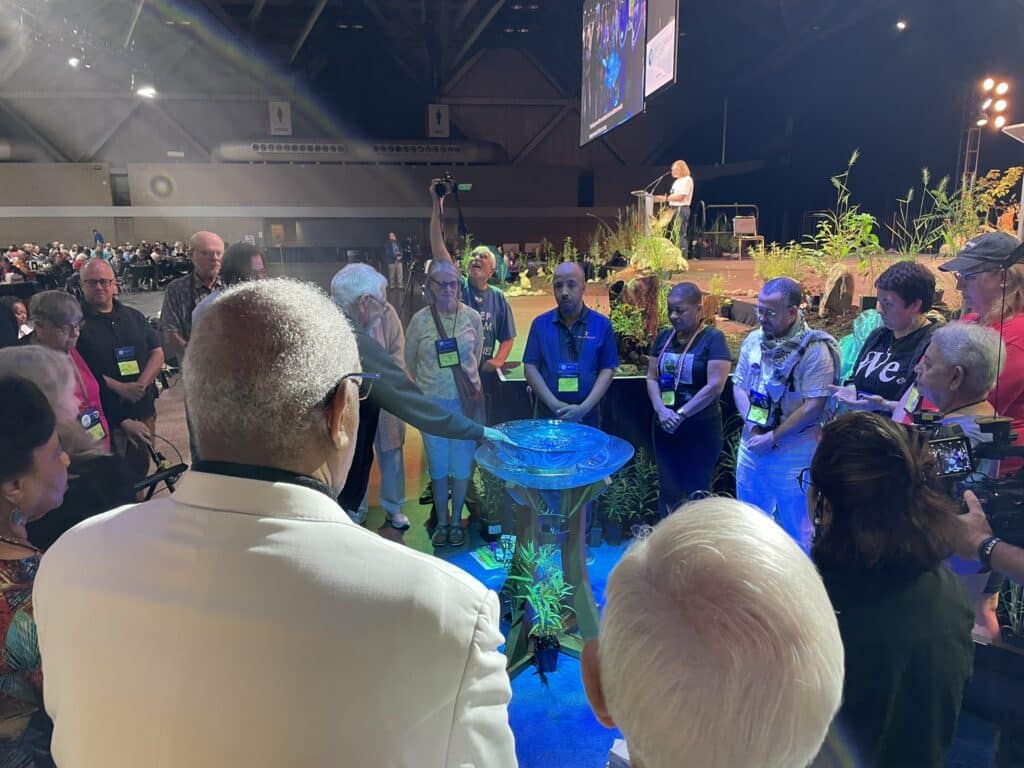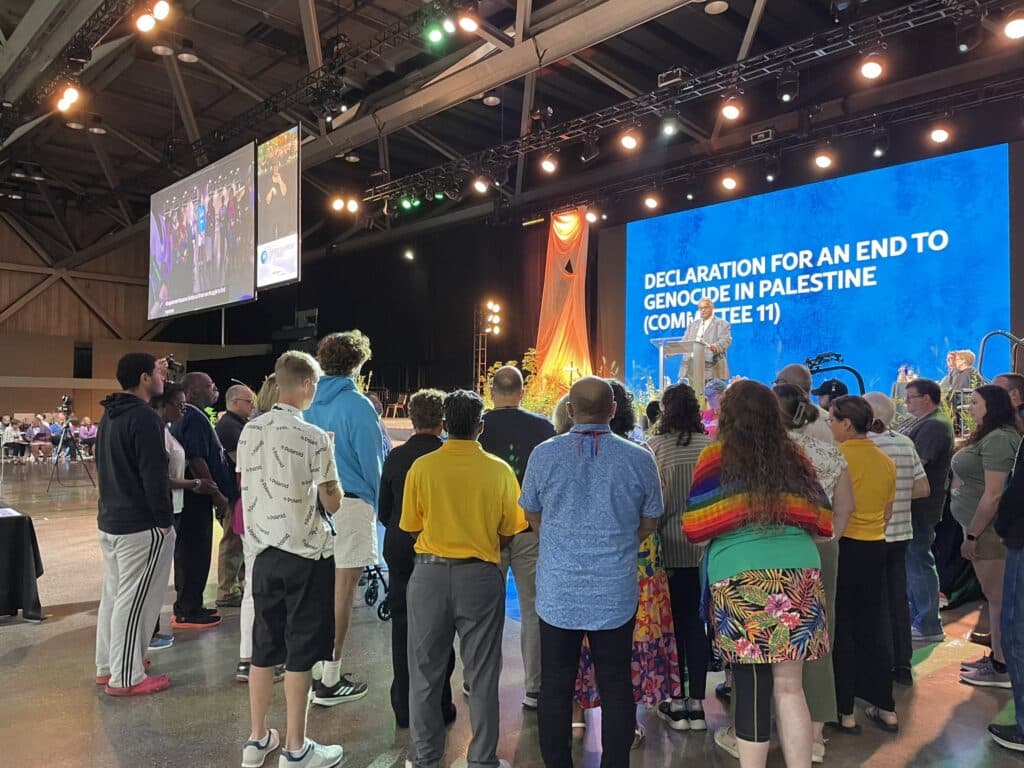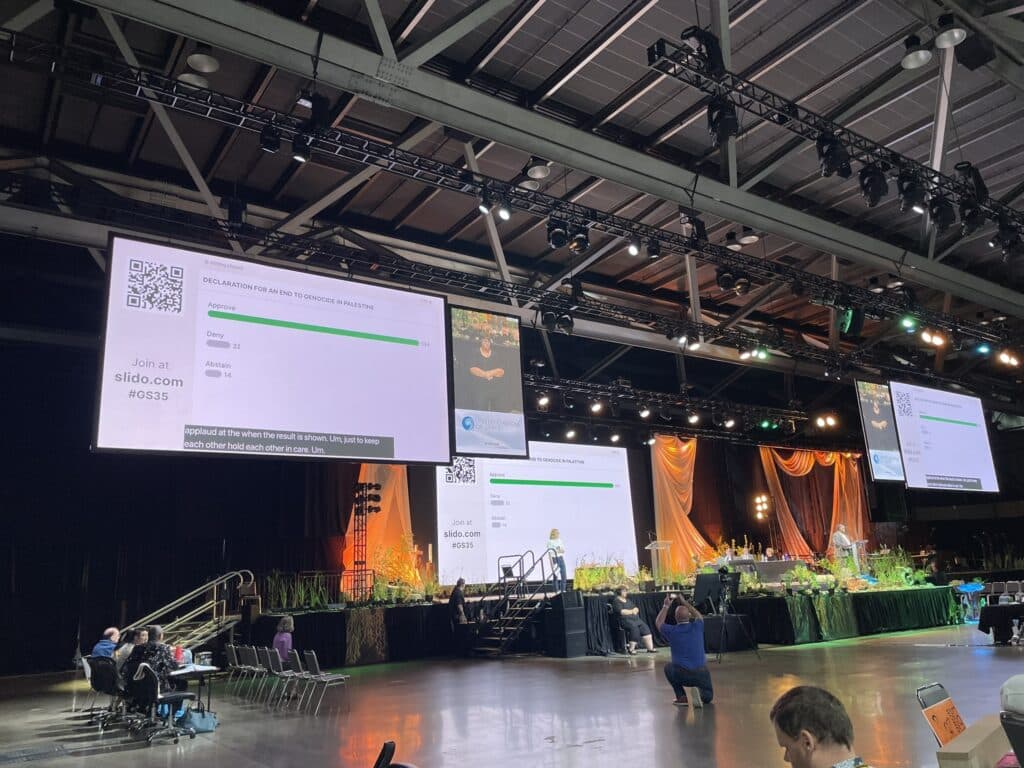General Synod passes declaration for an end to genocide in Palestine
Following heartfelt discussion and careful consideration, General Synod took a clear stand in naming the ongoing genocide of Palestinians “a humanitarian crisis that calls for immediate action.”
As the “Declaration for an End to Genocide in Palestine” was brought to the delegate body, the Rev. Emma Loane, chair of the resolution’s committee #11 and delegate from the Indiana-Kentucky Conference, named an awareness of “bearing the weight of a topic of immense global urgency marked by devastating human cost and long, painful histories behind every word.”
She took special care to invite its committee members to gather around the baptismal fount near the Synod stage as the resolution was introduced “as a physical witness to the holy labor we carried out together,” she said.
The resolution was approved by 594 delegates, with 32 denying and 14 abstaining.

During over an hour of discussion on the Synod floor, all delegates who spoke offered support for the resolution or proposed and debated whether additional amendments should be added.
Mayadah Tarazi, a representative of longtime Global Ministries’ partner YWCA Palestine, shared that she is originally from Gaza where most of her family members still live and are sheltering in the church. She offered gratitude for the resolution, along with a heavy heart.
“This resolution is not an end, but a beginning, a faithful act of truth-telling in a time when truth is being silenced. The genocide is still happening. Every day, around 70 lives are lost in Gaza,” she said. “This resolution gives us hope that the church will move from words to faithful action through advocacy, divestment, education, and deep solidarity.”
Others also named the immense grief and urgency underlying the words of the resolution.
“When I see the tears of the people of Gaza, I see the tears of Black Americans. When I see the tears of the people of Gaza, I see the tears of Native Americans. And in these tears, I see the tears of God. The world has abandoned the people of Gaza like in 1994 when the world abandoned the people of Rwanda,” said Jerry Locula, a delegate from the Minnesota Conference. “On a daily basis, the genocide in Gaza has been implemented by American taxes. Do we feel guilty of this? Every aspect of international law has been frustrated in Gaza, and we are called here to be the church.”
Amendments considered
Two amendments were put forward on the Synod floor, and while delegates debated and voted on them, neither ultimately passed.
One proposed amendment sought to add additional words to affirm the UCC’s unwavering opposition to antisemitism. Some delegates expressed that adding this could help to strengthen care and relationships with Jewish communities. Other delegates drew attention to multiple parts of the resolution that already state opposition to antisemitism.
Peter Makari, Global Ministries executive for Middle East & Europe, was called upon to speak to the UCC’s history of speaking and acting against antisemitism.
“The UCC has spoken extensively over the years, including as far back as 1983 about the question of antisemitism, clearly denouncing it, clearly expressing affirmation of our relationship with the Jewish community, and participates consistently in dialogue with our Jewish friends,” he said.

Another proposed amendment, brought by Joe Moat of the Pennsylvania Southeast Conference, sought to insert words into the resolution that explicitly denounce Hamas. Moat said he believed that “adding mention of Hamas, its partners, and other entities in this resolution is crucial in speaking to the tragedy and complexity of this issue.”
After much engaged debate, this amendment was denied by delegate vote.
Fred Rogers, delegate from the Minnesota Conference, was one of many who spoke against the change.
“Acts of terrorism are not justifiable, and the UCC has already denounced the actions of October 7 and reasserted its deep opposition to antisemitism,” he said. “This resolution addresses the current genocide. The urgency of this concern increased in 2025 because of our president’s support and encouragement for the cleansing of Gaza. Attempting to balance concern about the 2025 genocide with a reference to the 2023 attack by Hamas shifts the focus and dilutes our collective responsibility for the present.”
‘Speak the truth in love’
Following the extensive discussion, the resolution passed with broad support in the form that was presented to the delegate body by the resolution’s committee.
Amendments that had been made by the committee sought to clarify theological commitments that all people are made in the image of God and reject that any violence can be justified by faith. They also sought to solidify the connection to previous resolutions, particularly the 2021 Declaration for Just Peace Between Palestine and Israel.
“Passing this resolution says we will not look away. We will not be silent. We will speak the truth in love. We will follow Jesus who blesses the peacemakers and draws near to the suffering,” Loane said.
Content on ucc.org is copyrighted by the National Setting of the United Church of Christ and may be only shared according to the guidelines outlined here.
Related News
Righteous Indignation
It is not easy to dismiss the disquietude that sets in watching the events unfolding in the...
Read More‘A ray of light in the darkness’: Climate Hope advocates celebrate limited cuts for EPA
In recent months, a new group formed in East Lansing, Michigan, to become one of several...
Read MorePastor keeps end-of-life conversations alive, touts the ease of UCC’s FreeWill
O death, where is thy sting? Pastors can answer this Pauline question with great...
Read More


